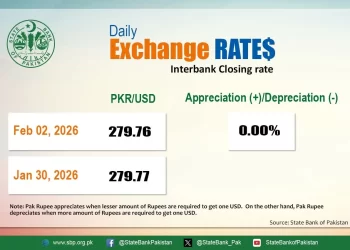LONDON: Oil prices inched up on Wednesday nearing their highest level in almost two months, driven by forecasts for an eventual inventory drawdown during the third quarter peak summer demand season and geopolitical risks from the Middle East conflict.
The American Petroleum Institute (API) on Tuesday reported U.S. crude oil stocks rose by 914,000 barrels, market sources said. Still, analysts expect them to decline by nearly 3 million barrels in official inventory data due on Wednesday.
Brent crude oil futures were up 47 cents, or 0.6%, to $85.48 a barrel by 1136 GMT. U.S. West Texas Intermediate crude futures gained 54 cents, or 0.7%, to $81.37.
Oil prices steady
“The ubiquitous view is that demand will increase during the summer,” said Tamas Varga of oil broker PVM. “Geopolitics is still seen as a supportive element of the equation.”
However, a stronger dollar capped gains, as the market remained optimistic of a rate cut before the end of the year.
The dollar was up 0.34%, highlighting currency strength that makes dollar-priced oil more expensive for buyers holding other currencies.
Official U.S. inventory data from the Energy Information Administration is out at 1430 GMT.
“It seems the market is shrugging off demand concerns for now, anticipating inventory drawdowns in peak third quarter demand season,” said Suvro Sarkar, energy sector team lead at DBS Bank.
Strength in front-month prices is also indicating strong physical demand for oil, a boon for prices in the near-term, analysts say. August Brent and WTI prices were around 80 cents a barrel higher than September prices.
“Key oil market indicators are signalling that crude’s rebound is reflecting a stronger underlying physical market,” JP Morgan analysts wrote in a client note.
On the geopolitical front, Houthi attacks on shipping in the Red Sea and mounting Israel-Hezbollah hostilities in Lebanon are also bullish for oil prices, DBS’ Sarkar said.
The Houthis have so far sunk two vessels and seized another, and said on Tuesday they used a missile to hit a vessel in the Arabian Sea.
LONDON: Oil prices inched up on Wednesday nearing their highest level in almost two months, driven by forecasts for an eventual inventory drawdown during the third quarter peak summer demand season and geopolitical risks from the Middle East conflict.
The American Petroleum Institute (API) on Tuesday reported U.S. crude oil stocks rose by 914,000 barrels, market sources said. Still, analysts expect them to decline by nearly 3 million barrels in official inventory data due on Wednesday.
Brent crude oil futures were up 47 cents, or 0.6%, to $85.48 a barrel by 1136 GMT. U.S. West Texas Intermediate crude futures gained 54 cents, or 0.7%, to $81.37.
Oil prices steady
“The ubiquitous view is that demand will increase during the summer,” said Tamas Varga of oil broker PVM. “Geopolitics is still seen as a supportive element of the equation.”
However, a stronger dollar capped gains, as the market remained optimistic of a rate cut before the end of the year.
The dollar was up 0.34%, highlighting currency strength that makes dollar-priced oil more expensive for buyers holding other currencies.
Official U.S. inventory data from the Energy Information Administration is out at 1430 GMT.
“It seems the market is shrugging off demand concerns for now, anticipating inventory drawdowns in peak third quarter demand season,” said Suvro Sarkar, energy sector team lead at DBS Bank.
Strength in front-month prices is also indicating strong physical demand for oil, a boon for prices in the near-term, analysts say. August Brent and WTI prices were around 80 cents a barrel higher than September prices.
“Key oil market indicators are signalling that crude’s rebound is reflecting a stronger underlying physical market,” JP Morgan analysts wrote in a client note.
On the geopolitical front, Houthi attacks on shipping in the Red Sea and mounting Israel-Hezbollah hostilities in Lebanon are also bullish for oil prices, DBS’ Sarkar said.
The Houthis have so far sunk two vessels and seized another, and said on Tuesday they used a missile to hit a vessel in the Arabian Sea.









